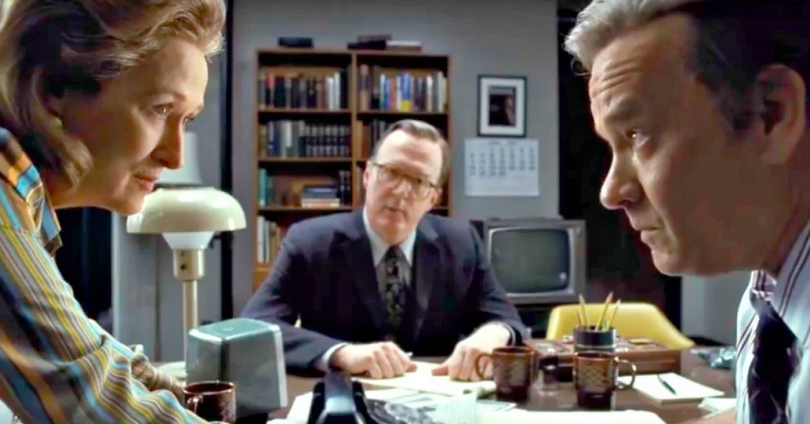aNewDomain — Steven Spielberg’s new movie The Post depicts a newspaper’s decision to defy the government, risk its financial health and imprisonment of its editors in order to report a hard truth and defend the press’ First Amendment rights by publishing the Pentagon Papers.
After the Washington Post’s decision to inform the American people that top government officials had k nown that the Vietnam War was unwinnable yet had repeatedly lied about it for years, editor Ben Bradlee (played by Tom Hanks) dumps a pile of out-of-town newspapers on a desk for publisher Katherine Graham (Meryl Streep) to see.
nown that the Vietnam War was unwinnable yet had repeatedly lied about it for years, editor Ben Bradlee (played by Tom Hanks) dumps a pile of out-of-town newspapers on a desk for publisher Katherine Graham (Meryl Streep) to see.
We’ve started a “rebellion,” Bradlee informs Graham. We’re no longer in speaking truth to power.
No way would that happen today.
I was pleased to see that “The Post” highlights the pressures and biases that weighed against publication: a publisher undermined by sexism and low expectations, a paper trying to raise capital under the eye of nervous bankers, the Nixon Administration’s take-no-prisoners prosecutorial abuse by a vicious attorney general, and — not least — the Post’s cozy establishmentarianism, centered around Graham’s famous hard-drinking salons where reporters hobnobbed with the officials they were supposed to cover objectively.
After a lot of wavering and gnashing of lawyerly teeth, Graham finally makes the call: Go to press.
The key point of this story, which isn’t made in the movie and few younger moviegoers are likely to be aware, is that it was her decision to make. The Graham family held controlling interest in the Washington Post Company.
Missing: Editorial Freedom
Great newspaper families like the Grahams, the Chandlers and the Sulzbergers were quirky and often had bad politics. But they also had something today’s corporate, publicly-traded media outlets do not: editorial freedom.
They didn’t always do the right thing. But they could. So sometimes they did.
Sadly, those days are gone.
Amazon CEO Jeff Bezos, reportedly a right-leaning libertarian, bought the Post in late 2013. What reception would a Daniel Ellsberg (who leaked the Pentagon Papers) or an Edward Snowden get if they contacted a Post WAPO reporter today, under Bezos?
Snowden’s case is indicative. The Post and three other papers published Snowden’s NSA leaks in 2013, months before Bezos took over. In 2016, the Bezos-owned Post called upon President Obama to refuse a Snowden’s pardon application. In so doing, wrote Glenn Greenwald, the Post “achieved an ignominious feat in U.S. media history: the first-ever paper to explicitly editorialize for the criminal prosecution of its own source — one on whose back the paper won and eagerly accepted a Pulitzer Prize for Public Service.” (The other three papers were pro-pardon.)
Even more obnoxiously, the Post’s Snowden editorial didn’t mention its major conflict of interest related to intelligence agencies like the NSA. Amazon — the Post’s sister company under Bezos — had the CIA (where Snowden also worked) as a $600 million client.
That’s more than twice what Bezos paid for the Post.
Coincidence? Je pense que non.
The Los Angeles Times sells “Speaking Truth to Power” hoodies. But when the power is the LAPD — and the LAPD owns the paper — the Times publishes lies.
My regular readers are familiar with the sordid details of my 2015 firing by The Los Angeles Times as a favor to LAPD Chief Charlie Beck. You’re not much of a political cartoonist in L.A. if you don’t go after the militarized, racist, violent LAPD — and the Times published many of my anti-LAPD/anti-Beck toons over the years.
So did the Pasadena Weekly, which drove the boys in blue so nuts that they asked its publisher to fire me. PW refused.
Then the Times’ corporate parent, the Chicago-based Tribune Publishing, hired an LAPD-connected billionaire and wannabe politician, Austin Beutner, as publisher for the Times. Beutner appears to have midwifed a deal in which the LAPD patrolmen’s $16.4 billion union retirement fund moved to a firm that invested eight figures into a fund containing Tribune stock. (Given that newspaper stocks in general and Tribune specifically had been losing value, it’s a fair assumption that the buy was more about influence than taking care of retired LAPD officers.)
Within weeks — and explicitly against Times rules — the same union issued an award to Beutner for his “support [of] the LAPD in all that they do.”
Beck asked his friend Beutner to use ginned-up “evidence” to fire and smear me; Beutner, the cop-award winner, complied, and even stayed the course after the truth came out and I was vindicated. My defamation case against Beutner and the Times is in court.
The Times never disclosed to its readers about Tribune’s business relationship with the LAPD union.
It’s a level of corruption that would make Al Capone blush. Yet it’s perfectly legal in the United States for a police union to buy a newspaper. Indeed, the same union bought part of the San Diego Union-Tribune in 2009 — and leveraged its ownership to ask that the U-T fire critics of the police.
Come to think of it, isn’t it weird that a company with more than half a billion dollars in business with the CIA is allowed to own a major news organization like the Post?
Given the Trump Administration’s attacks against “fake news” and the news media, it may seem paradoxical to suggest government action as a solution to the corruption of the news media as we’re seeing at outlets like the Washington Post and Los Angeles Times. But the evidence is clear. Outrageous deals such as those between the Post’s owner and the CIA and between the Times’ owner and the LAPD amount to government censorship of the news media — a violation of the First Amendment’s fundamental principle.
Congress should prohibit such arrangements.
For aNewDomain in New York, I’m Ted Rall.
Check out the trailer for Spielberg’s The Post, below.













